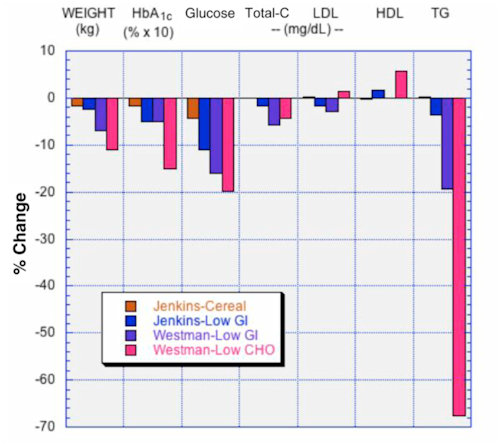Food Based Dietary Guidelines for South Africa
In my view the South African Guidelines are much better than the American Guidelines. There is evidence of independent development which is rare. These documents are different to those published in the USA or New Zealand.
![]() The new South African food based dietary guidelines PDF (2013)
The new South African food based dietary guidelines PDF (2013)
South African experts developed the Guidelines for Healthy Eating 10 years ago to provide information to South Africans to help them make healthy food choices; recently, the guidelines were reviewed and updated to be in line with new scientific evidence.
Revised general food-based dietary guidelines for South Africans, 2012
Enjoy a variety of foods.
Be active!
Make starchy foods part of most meals.
Eat plenty of vegetables and fruit every day.
Eat dry beans, split peas, lentils and soy regularly.
Have milk, maas or yoghurt every day.
Fish, chicken, lean meat or eggs can be eaten daily.
Drink lots of clean, safe water.
Use fats sparingly. Choose vegetable oils, rather than hard fats.
Use sugar and foods and drinks high in sugar sparingly.
Use salt and food high in salt sparingly.
Zoë Harcombe
![]() Zoë Harcombe is an expert in systematic review and meta-analysis. She studied the Naudé Review and found many errors. All but one favour the "balanced diet".
Zoë Harcombe is an expert in systematic review and meta-analysis. She studied the Naudé Review and found many errors. All but one favour the "balanced diet".
Among the errors, Harcombe said the researchers have:
Included studies that failed their own inclusion criteria.
Used invalid and subjective meta-analysis sub-grouping.
Made data extraction that was "repeatedly inaccurate."
The authors claim to have reviewed evidence for low-carb diet but have used their own definition of what a low-carbohydrate diet is. They "could not judge very-low-carbohydrate diets because they did not study them."
The average dietary intake for 14 studies was 35% carbohydrate, 35% fat and 30% protein. That's very different from the 5% to 10% carbohydrate and 80% to 85% fat, of a genuinely low-carb, high-fat diet.
Harcombe said the review also set isocaloric (having similar caloric values) as a criterion. This negated the satiety advantage of low-carb diets. Satiety is a key effect of the low-carb diet. After a meal you feel satisfied and remain so. You will not be looking for a snack in two hours. That's a big advantage.

Dr Tim Noakes and Dr Zoë Harcombe in court
Here are supportive statementsfrom established associations regarding the use of low-carbohydrate diets.
Low Carbohydrate versus Isoenergetic Balanced Diets for Reducing Weight and Cardiovascular Risk: A Systematic Review and Meta-Analysis
Celeste E. Naudé , Anel Schoonees, Marjanne Senekal, Taryn Young, Paul Garner, Jimmy Volmink
PLoS One Journal, July, 2014. ![]() http://dx.doi.org/10.1371/journal.pone.0100652 The full text is available from that link.
http://dx.doi.org/10.1371/journal.pone.0100652 The full text is available from that link.
 |
 |
 |
| Dr Celeste-Naudé | Prof Jimmy Volmink | Prof Marjanne Senekal |
|---|
There's considerable pressure in South Africa, to defend the South African Dietary Guidelines against the popularity of the Banting Diet promoted by The Real Meal Revolution and Dr Tim Noakes. This study does NOT mention the Banting Diet, it does mention the Atkins Diet. Sadly, the authors report this study in the press, as clear evidence that the Banting diet failed to offer any advantage over the "balanced Diet" usually recommended by South African dietitians.
The authors say; "Some popular weight loss diets restricting carbohydrates (CHO) claim to be more effective, and have additional health benefits in preventing cardiovascular disease compared to balanced weight loss diets."
The Banting diet makes that claim. The Banting diet is intended for people who when eating the "balanced diet," to use the Stellenbosch term, find it difficult to control weight gain, or have ![]() metabolic syndrome, or
metabolic syndrome, or ![]() type 2 diabetes. These people are probably insulin resistant, and we might expect that their livers are accumulating excess fat. The "balanced diet" is making them sicker, according the Banting or LCHF paradigm.
type 2 diabetes. These people are probably insulin resistant, and we might expect that their livers are accumulating excess fat. The "balanced diet" is making them sicker, according the Banting or LCHF paradigm.
The "balanced diet" uses an energy system based on glucose metabolism. Glucose metabolism relies on insulin to control the glucose levels in the blood. The key to the Banting diet is to use your lipid metabolism which only operates if insulin levels in the blood are very low. That demands a very-low carbohydrate diet. Such a diet must also be a high fat diet, if the body is get enough energy. Stellenbosch University insist on describing the Banting Diet as a high protein diet, which demonstrates that either they don't understand to process at all, or they are trying to confuse the issue.
The research in question is a systematic review and meta-analysis of 19 studies. The PLoS (Public Library of Science) One journal, published it in 2014. It is also known as the "Stellenbosch Review." It’s probably more correct to call it the Stellenbosch University, University of Cape Town and Cochrane Collaboration Review.
Lead author is Dr Celeste Naudé of ![]() Stellenbosch University's Centre for Evidence-based Healthcare and now also representing the Cochrane Collaboration.
Stellenbosch University's Centre for Evidence-based Healthcare and now also representing the Cochrane Collaboration.
Co-authors of the study include Dr Marjanne Senekal. She is associate professor and head of UCT Division of Human Nutrition. Senekal is a consultant to the HPCSA in the case against Noakes.
Another author is Prof Jimmy Volmink, dean of Stellenbosch Faculty of Health Sciences and a member of the Cochrane Collaboration Centre at the Medical Research Council in South Africa.
Conclusions
"Trials show weight loss in the short-term irrespective of whether the diet is low CHO or balanced. There is probably little or no difference in weight loss and changes in cardiovascular risk factors up to two years of follow-up when overweight and obese adults, with or without type 2 diabetes, are randomised to low CHO diets and isoenergetic balanced weight loss diets."
Based on the many papers I've read in the last two years, I find that conclusion unbelievable. So am I the biased one?
The researchers say, that in a "balanced diet" 45% to 65% of your energy should come from carbohydrates. Then they claim that any diet that is 40% carbohydrate or less is "low-carbohydrate" and extend that to mean "like the Atkins Diet" or like their real target the Banting Diet. That gave them the ability to bring in diets that were not low-carbohydrate diets at all, and classify them as low-carb. That's shifting the goal posts.
Examples of Why the Study Fails.
![]() The study from De Luis et al. (2009) allows 38% carbohydrates, which is about 143g a day. Almost three times the carbohydrate the Banting Diet recommends. (50g a day)
The study from De Luis et al. (2009) allows 38% carbohydrates, which is about 143g a day. Almost three times the carbohydrate the Banting Diet recommends. (50g a day)
![]() The study from Klemsdal et al. (2010) Was intended to be a low-glycemic index dietary study, once again with high carbohydrate 37% in this case.
The study from Klemsdal et al. (2010) Was intended to be a low-glycemic index dietary study, once again with high carbohydrate 37% in this case.
![]() The study from Lim et al. (2010) began well, there were four diets being tested. The very-low-carbohydrate group has excellent three month success, but the researchers lost control after three months, and from 9 months to 24 months, it appears that the mean intake of carbohydrate was 149g a day, no longer low-carbohydrate.
The study from Lim et al. (2010) began well, there were four diets being tested. The very-low-carbohydrate group has excellent three month success, but the researchers lost control after three months, and from 9 months to 24 months, it appears that the mean intake of carbohydrate was 149g a day, no longer low-carbohydrate.
![]() The trial from Sacks el al. (2009) tested four diets, and looks promising but the authors say they "followed recommendations for cardiovascular health," which meant that their Low-carbohydrate Diet was 35% carbohydrate, with 40% fat. Once again, lipophobic, and nothing like a very-low-carbohydrate diet as recommended by Atkins or Banting.
The trial from Sacks el al. (2009) tested four diets, and looks promising but the authors say they "followed recommendations for cardiovascular health," which meant that their Low-carbohydrate Diet was 35% carbohydrate, with 40% fat. Once again, lipophobic, and nothing like a very-low-carbohydrate diet as recommended by Atkins or Banting.
The diabetes study by ![]() Guldbrand, H., Dizdar, B., Bunjaku, B. et al. (2012) used a low carbohydrate level of 20%, double that recommended by Banting, and found that the diet made glycemic control much easier, just as Dr. Tim Noakes claims.
Guldbrand, H., Dizdar, B., Bunjaku, B. et al. (2012) used a low carbohydrate level of 20%, double that recommended by Banting, and found that the diet made glycemic control much easier, just as Dr. Tim Noakes claims.
Of the nineteen trials chosen for inclusion in the study, only ONE, was actually a Banting style diet. So they assembled a set of "low-carb diets" most of which were designed for some other purpose, only one of which was low-carb in any sense that either Dr. Westman for Atkins, or Dr. Noakes for Banting would recognise. They averaged the results, and compared that with the standard diet and declared "there is no difference."
Naudé and her co-authors have concluded that "when people eat a similar amount of energy in either the low-carb diet or a balanced diet, there was no difference in weight-loss after three to six months." In other words, low-carb diets are no better for weight loss than conventional, high-carb, low-fat "balanced diets." However, that shouldn't be a surprise. By definition if the calorie theory of weight loss is valid, and energy intake and output are similar, no other outcome is possible.
If the researchers were to compare their "balanced diet" with real very low-carbohydrate diets they would have to make a very different conclusion. They would have to find that the ketogenic diet is much better than the "balanced diet" for weight loss. For two reasons: one that the body changes the metabolism rate to maintain homeostasis if it can; and two, when the amount of carbohydrate eaten each day is very-low, less than 50g, the lack of insulin eliminates fat accumulation and initiates fat burning.
 Here is clear evidence of the much better blood profile from a very-low-carbohydrate diet, it's one of dozens of studies showing the same thing. Studies the Stellenbosch researchers managed to "exclude" from their analysis.
Here is clear evidence of the much better blood profile from a very-low-carbohydrate diet, it's one of dozens of studies showing the same thing. Studies the Stellenbosch researchers managed to "exclude" from their analysis.
The researchers at Stellenbosch University are clever people. They know exactly what they are doing. They know that in publicly discrediting the Banting Diet, they cheated. But they have a duty to their long term sponsors. Their own future employment depends on the public being confused, by a clutter of commercial and non-commercial, nutritional messages that make no practical sense. The Banting Diet is a profit losing diet for many industries. Ketones, the key to a Banting Diet, can't be patented and sold. Banting is popular because it works. Obesity is not a difficult problem to resolve, unless of course resolving it might cost you your income. Then you might think of ways to milk the system for a bit longer.
